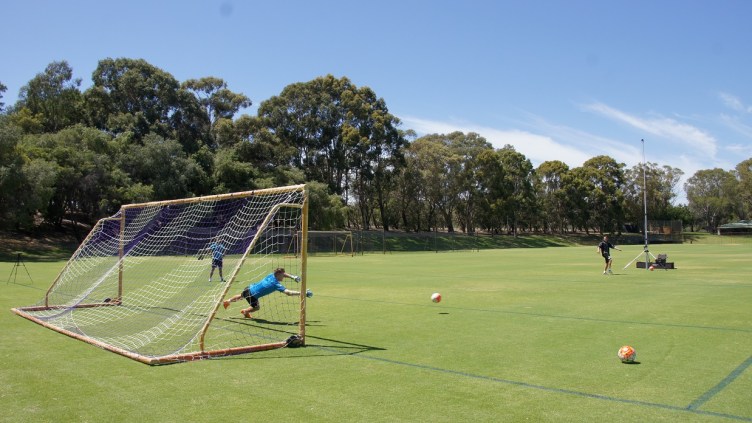Perth Glory FC has partnered with the Sports Science department at Edith Cowan University in a symbiotic relationship that will advance research in the field, while also optimising player and coaching performances.
Using multiple cameras to capture player movement from several different angles, Dr. Sophia Nimphius and Dr. Fadi Maayah of ECU were in attendance today during goalkeeping practice.
“The two things we’re really looking at are how they move and how they’re landing. Both of which have a big influence not just in their performance but potential injury,” said Sophia.
While she is an expert in the fields of biomechanics and physiology, Dr. Nimphius relies on the coaches’ expertise when it comes to instructing the athletes on changing their approach.
“The coaches know exactly what they’re looking for. So what we’re trying to do is utilise the coaches’ knowledge and what words and cues and instructions they use that illicit the best change in the athlete’s performance.
“The first thing is using the video feedback to observe whether how he coached changed how the athlete responded. And if that happens then it’s really influential on being able to coach really effectively later on so it’s kind of a combination of the coaching science mixed with the sports science at the same time to maximise the high potential of these athletes.”
While most of the video angles ECU uses are level with the players, they use one high-angle camera so that they can get a broad view of the action.
“We get to see everything that’s happening. The trajectory of the ball coming in, how long it takes him to react to the ball, and then obviously the actual movement that he performs. So from that you can pull how long it takes for him to react as well as look at the movement pattern.”
The high camera angle is essential for the collection of data that Doctors Nimphius and Maayah then relay to the coaches. It’s then the coaches’ responsibility to best pass that information along to the players.
“A lot of what Fadi is doing here and what the coaches are doing is not trying to tell the players what to do, but allow them to respond within their own strengths and weaknesses to improve their own performance. Because making someone do something may actually be contradictory to what they are actually capable of doing. So that feedback gives them an internal control so they self-correct.”
Dr Maayah said this was one of several analyses the University was undertaking with Glory over this season.
“We watch with the coaches first, but the next step is for us to do more in-depth analysis ourselves and then we give them what the science says. We do lots of work behind the scenes, but it’s about keeping the science away from the players so we just give it to the coaches and they will see what’s the right technique, what’s the wrong technique.”
We’ll see what impact the increased use of sports science has for Glory with 23 A-League rounds still to play.
The next Glory match is Sunday, 15 November away to Brisbane Roar.
#WestvsRest #GoGlory




